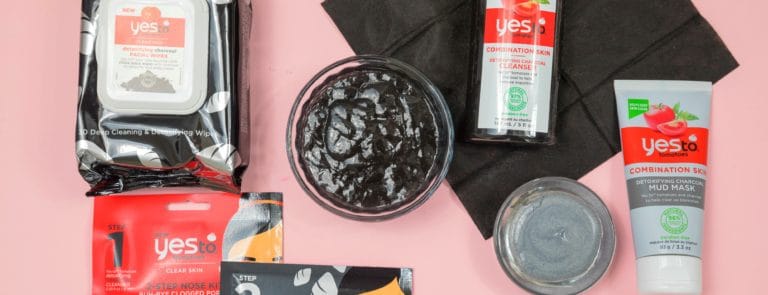15% off €25
Top 3 vitamin C serum benefits

All hail Vitamin C serum, if ever there was an ‘it’ product, it’s this little beauty.
This single product can deliver a lot of skincare goodness, ranging from brightening dull skin to increasing our skin tone, providing a barrier against pollution and moisturising skin.1,2,3,4
In a nutshell, this one serum is said to transform skin by making it look:
- Healthier – tick
- Glowing – tick
- Brighter – tick
- Smoother – tick!
And it’s precisely because of this that it’s become such an essential skincare ingredient.5
Skip to:
What is Vitamin C serum?
What is it about this serum that makes it such a skincare saviour?
Well, most of us immediately associate Vitamin C with bright, juicy oranges, which are packed full of the stuff. If you’re one them, you wouldn’t be wrong.
Vitamin C can also be found in lots of other fruit and veg, such as broccoli, strawberries, peppers and blackcurrants.6
This vitamin is also known as ascorbic acid and is responsible for:
- Protecting the cells in our body and keeping them healthy6
- Maintaining healthy skin
There are also derivatives of Vitamin C, including:
- Sodium ascorbyl phosphate
- Ascorbyl palmitate
- Retinyl ascorbate
- Tetrahexyldecyl ascorbate
- Magnesium ascorbyl phosphate7
These derivatives are used to create Vitamin C serum, and while they may not be 100% pure sources of Vitamin C, like the examples above are, they’re still capable of pretty powerful, almost mind-blowing stuff.
The moment you put them on your skin, they enable pure Vitamin C to be released into your skin cells.
Sounds somewhat magical, doesn’t it, we bet you’re looking at them in a whole new light now, aren’t you?8
3 vitamin C serum benefits for face
Not sure what vitamin C is good for? We’ve already briefly touched on the main benefits, but if you’re up for a bit of an ‘at a glance’ recap, which we’re always up for, then here you go:
-
Protects skin from everyday environmental damage
UV light and air pollution can create free radicals in the skin that are far from desirable. They can our skin look dull and potentially lead to the formation of lines and wrinkles.
However, Vitamin C serum, everybody’s skincare knight in shining armour, fights off these skin nasties and protects it.9,10
-
Helps get that collagen pumping again
Vitamin C helps build collagen and delays skin from losing its structure, which is held in place by collagen.
At the same time, it can also help slow down the appearance of wrinkles and fine lines.1
-
Assists with lightening up brown spots
Vitamin C serum’s reportedly renowned for helping even out pigmented skin and actually stop it from it happening in the first place.11
Do Vitamin C serums really work?
Is it really possible for one skincare product to work its magic in so many different ways?
You’d better believe it, because word on the beauty and skincare block is it really does stand up to all the hype.12
Just one Google of ‘Do Vitamin C serums really work?’ and you’re presented with no end of articles, containing comments from skincare professionals, all bigging up Vitamin C serums for a myriad of reasons.
Some marvel about its ability to improve skin elasticity, reduce wrinkles and stimulate collagen production.
Meanwhile, others rave about how it can potentially help prevent skin from being damaged by free radicals, AKA radiation, sunlight and smoke.
Not to mention the fact it can be used on sensitive, wrinkled, acne-prone, sun-damaged and clogged skin too.
Scientific research on vitamin C serums for skin
There’s plenty of research out there about the benefit of Vitamin C serum for face too.
They include a study by researchers at the University of Leicester and the Institute of Molecular Cellular Biology in Portugal, who confirmed Vitamin C serum’s role in boosting skin elasticity and collagen production and reducing fine lines and wrinkles.13
As for if Vitamin C serums will work for you, we guess there’s only one way to find out, by giving them a whirl. And if you need a hand choosing one or two, keep reading, we’ve listed some of the most popular Vitamin C serums for you, as reviewed by our customers, below.
The final say
How do you feel about Vitamin C serum now? Hopefully, you’re feeling all up to speed on all there is to know about Vitamin C benefits and are possibly looking forward to giving it a go?
For more on the wonders of Vitamin C and why it’s so fabulous for skin, have a read of this….’What’s the big deal about Vitamin C for skin?’ You’ll most certainly have made your mind up about it after reading this!
Vitamin C top picks
Vitamin C top picks
Wondering which Vitamin C serum is best? Check out these, they’re some of the most popular among our customers right now…


Last updated: 18 August 2022
- https://www.ncbi.nlm.nih.gov/pmc/articles/PMC5605218/
- https://www.ncbi.nlm.nih.gov/pmc/articles/PMC5579659/
- https://www.frontiersin.org/articles/10.3389/fphys.2018.00819/full
- https://www.mdpi.com/2079-9284/8/3/89/pdf
- https://www.harpersbazaar.com/beauty/skin-care/g27482223/vitamin-c-serums/
- https://www.nhs.uk/conditions/vitamins-and-minerals/vitamin-c/
- https://pubmed.ncbi.nlm.nih.gov/19099546/
- https://www.byrdie.com/vitamin-c-benefits
- https://www.byrdie.com/vitamin-c-benefits
- https://dermnetnz.org/topics/topical-vitamin-c
- https://www.ncbi.nlm.nih.gov/pmc/articles/PMC7802860/
- https://verilymag.com/2017/03/vitamin-c-serum-skincare-experts
- https://www.eurekalert.org/news-releases/871963



